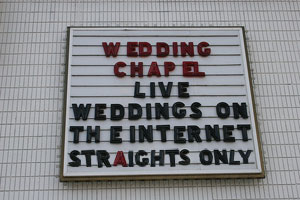ON THE APPALLING PASSAGE OF PROPOSITION 8

Separate and Unequal
Needless to say, I am ecstatic about the presidential election and will write later about what President Obama's election means to me.
But the passage of Proposition 8 -- along with other anti-gay initiatives in Arizona, Arkansas, and Florida -- is seriously dampening my celebration.
A majority of Californian voters just granted new fundamental civil rights to egg-laying chickens while stripping fundamental civil rights away from loving gay and lesbian human beings.
November 4, 2008 -- rightly heralded as a national civil rights milestone -- also marked the first time that a state has stripped away a marriage-related civil right to a discriminated minority group after initially granting it.
As someone who has studied the judicial branch's handling of sexual orientation and the law, I can confidently predict that no state or federal court will get in the way of Proposition 8.
Which is to say, unless California voters pass a new initiative that reinstates gay marriage, gay and lesbian Californians will never again have the right to marry.
(There is a strong legal argument that the 18,000 gay marriages that took place over the last few months will remain valid, however, as the language of Prop. 8 does not include any intent to apply retroactively.)
I know that Gloria Allred is filing a lawsuit to stop Prop. 8, but her suit is unlikely to invalidate the initiative. Unlike Prop. 22 in 2000, Prop. 8 amends the state constitution; thus, there's essentially no argument that Prop. 8 violates state law.
Moreover, there is no viable legal argument that Prop. 8 conflicts with the U.S. Constitution or any federal law. Sadly, not one federal court has interpreted the Equal Protection Clause to require marriage equality for gays and lesbians. Keep in mind that under federal law, there is no right to be protected, for example, against hiring discrimination by an anti-gay employer. It would require some seriously "activist" Supreme Court justices to read a right to gay marriage into the Constitution.
Theoretically, Congress could pass a law mandating marriage equality that is intended to preempt state law. But the chances of that happening are about the same as Sarah Palin's chances of dominating on Jeopardy.
Thus, for now, Proposition 8 represents a nail in the coffin for full gay and lesbian equality in California.
Although dispirited, I remain optimistic, however, that we will eventually see full equality again in California.
This will require a new smartly-worded initiative, a better-organized movement, more money, and only an incremental shift in public opinion. (It was close, after all.)
Since we've seen the successful scare tactics of the fundamentalists' Yes on 8 campaign, any new initiative should probably make clear that places of religious worship will not be required to offer gay weddings.
For those who are with me on this civil rights struggle, we have a lot of work to do.
(OW chimes in)
Junichi, thanks for that informative - though sobering - reality check. I do want to add something here...
I've noticed that some people seem to forget that Prop 22 passed just eight years ago and, to me, it says a lot that, collectively, Prop 22 actually has been forgotten. The idea of gay marriage is prevalent enough to - on the one hand, spark a reactionary backlash as we've seen - but it's also common enough that we take its possibility for granted.
The other thing worth noting is that Prop 22 passed by a massive margin: 20+ points whereas Prop 8 is going to get by on just 4 points. I don't think you can really quantify tolerance but a five fold decrease in opposition to gay marriage in just eight years seems something worth thinking about.
Back when Prop 22 passed, I said, despairingly, to a few friends that "gay marriage will never happen in our lifetime" and one of them chided me to pay attention to the long view and see just how far things had come, even despite that evening's results and I think it's worth thinking on this too in our moment of discouragement.
The beauty of the state initiative system which is also its curse is that, in any given year, who knows what will come to the fore? And there's nothing stopping a well-organized campaign from putting the acceptance of gay marriage on next year's ballot.
And the next year's ballot.
And the next year's ballot.
Until that 4 point spread is gone.
American social justice has never taken a path of linear progress. There are always set-backs and resurgent periods of reactionary behavior. But I think this issue is winnable - absolutely winnable - with better organizing and better education especially in communities of color. As some of the exit polling has shown, the single-most community that came out for Prop 8 were African Americans - at 70%! - and the Latino community was also largely in favor of it too (~55-57%). Strikingly as well: the counties that voted against it, overwhelmingly, were the best educated in the state. No county where less than 10% of the population had bachelor's degrees (~20) voted against it.
So there's work to be done but this is not an impossibility (least of all in a state as mercurial as California). I think there's every reason to think that within the next eight year cycle, we'll see gay marriage legalized in California.
Junichi, a question for you: you think there'd be a state movement to outlaw any form of civil union that essentially grants the same rights to non-hetero couples?
Labels: civil rights, gay rights, No on Prop 8

<< Home